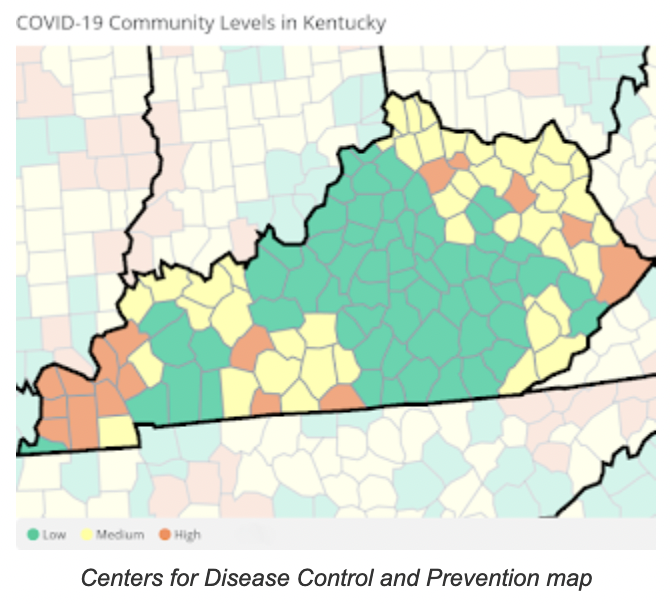Risk of Covid-19 increased last week in Ky.; booster vax rate low; exercise can thwart severe cases; dogs can detect the infection

By Melissa Patrick
Kentucky Health News
The federal Covid-19 risk map showed more Kentucky counties at medium and high risk of transmission than last week, and the number of counties at low risk dropped to just over half.
“Covid-19 does appear to be increasing following the Thanksgiving holiday so it’s important that if you haven’t gotten your booster that you do that,” Gov. Andy Beshear said Thursday at his weekly briefing, held before the latest risk-map was released.
He said current data shows that fewer than 11 percent of Kentuckians who are eligible to get the updated Covid-19 booster shot have gotten it.
The Centers for Disease Control and Prevention‘s latest risk map shows 17 Kentucky counties at high risk of transmission, a number that has been creeping up since early December when 10 counties were reported to have high risk. Such counties are shown in orange on the map.
Counties with high risk of transmission last week include the same cluster of counties in Western Kentucky from the last two reports; the other high-risk counties were scattered: Butler, Simpson, Monroe, Harrison, Robertson, Rowan, Johnson and Pike.
If you live in a medium or high-risk county, the CDC advises those who are at high risk of getting very sick to wear a well-fitting mask when indoors and in public and to consider getting tested before having social contact with someone at high risk for getting very sick and consider wearing a mask when indoors when you are with them.
The study looked at how exercise affected coronavirus outcomes in nearly 200,000 adults in Southern California. It found that people who worked out at least 30 minutes most days were about four times more likely to survive Covid-19 than inactive people, Gretchen Reynolds reports for The Washington Post.
The data in the study was collected before widespread coronavirus vaccines were available, but Robert Sallis, a senior author of the study, told Reynolds that he thinks the results would be similar among vaccinated people: “It is such a simple, inexpensive way to protect yourself.”
Toward that end, the Biden administration has restarted a program that allows every household in the country to receive four free Covid-19 test kits. These at-home tests can be ordered at CovidTests.gov. This is the third round of free kits the administration has made available.
People who have difficulty accessing the internet or need additional support placing an order can call 1-800-232-0233 (TTY 1-888-720-7489) to get help in English, Spanish, and more than 150 other languages, 8 a.m. to midnight ET any day. More information is at https://www.covid.gov/tests/faq.
Another study published this month found that dogs trained to detect Covid-19 infection by smell correctly identified individuals with active infections at concerts with a specificity of nearly 100% and a sensitivity of 81.58%.
The study used eight dogs of various breeds who were trained to detect positive Covid-19 samples. The dogs were presented with sweat samples from 2802 concertgoers at four events in Germany organized for the study. Each participant had been tested for Covid-19 with both a rapid antigen test and the more reliable PCR test, but the researchers, dog handlers and dogs did not know the results. Most of the human participants were vaccinated against Covid-19, but this did not affect the dogs’ ability to detect active infections.